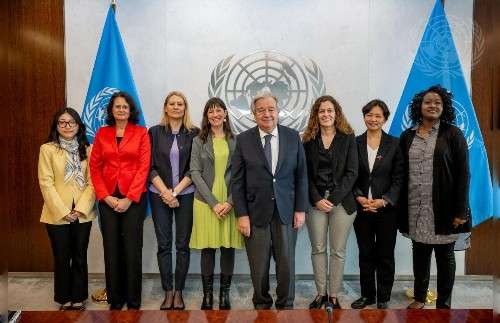Golnaz Esfandiari

American Brian Swank and his Iranian fiance, Mehraneh, say they can’t wait to start a life together.
Their courtship began when they met and fell in love four years ago, when Mehraneh was working on her PhD in landscape architecture at a campus of The State University of New York where Brian was studying, too.
But there is no telling when or where it might end.
Forced to return to her native Iran when her J-1 visa ran out in 2016 — a situation that Brian calls “the most heartbreaking experience” of his life — she remains barred from seeing him in the United States as they appeal for a waiver to the Trump administration’s travel ban on Iranians and a handful of other nationals.
Brian is meanwhile advised to stay out of Iran for what the U.S. State Department describes as a “risk of arbitrary arrest and detention of U.S. citizens.”
So, seemingly trapped between a recently reintensified rift between Washington and Tehran and their dedication to overcoming their unforeseen “hardship,” they send photos to mark birthdays, stay up late nights for Facetime, and occasionally splurge to meet up in far-off countries that accept Iranian visitors visa-free.
“We’re not political people, but we’ve become the victims of political problems between the two countries,” Mehraneh tells RFE/RL.
They are still awaiting word from U.S. authorities about the fate of Mehraneh’s application in July 2017 for a so-called fiance visa to move to the United States to start a life with Brian.
Thousands Of Cases
Mehraneh’s is one of the tens of thousands of requests for a waiver since President Donald Trump issued his first U.S. travel ban soon after taking office in January 2017.
Court challenges and an administration rethink spelled doom for the first two blacklists, before the current ban targeted the nationals of five countries with overwhelmingly Muslim populations –Iran, Libya, Somalia, Syria and Yemen — as well as North Korea and Venezuela, citing U.S. security concerns.
Trump has said that the ban is aimed at “keeping bad people (with bad intentions) out of the country.”
Waivers are rare. Over the first 11 months of the travel ban’s full implementation, just 6 percent of visa applicants from blacklisted countries — or 2,216 visa applicants out of nearly 38,000 — were granted waivers, Reuters reported on April 4.
As part of her application for the fiancée waiver, Mehraneh traveled to Abu Dhabi last year for an interviewed at the U.S. consulate there.
It’s now been more than eight months, she says, and “we don’t even know when we will hear back.”

Following a congressional inquiry, the consulate said in a January 21 letter that Mehraneh’s case is “undergoing administrative processing in order to qualify for a waiver under Presidential Proclamation 9645.”
U.S. immigration lawyer Leila Mansouri tells RFE/RL that she’s heard of just one or two cases of fiance visas being granted since the new U.S. ban went into effect.
“The [administrative processing] was taking an average of 10-14 months before the travel ban, which was already a long time, and we were pleading with the State Department at that time to improve it,” Mansouri says. “But now it seems no end is sight.”
‘There’s A Misconception’
The United States has labeled Iran a “state sponsor of terrorism” since 1984, although it is unclear what effect, if any, such a designation has on specific cases.
U.S. officials have said the countries affected by Trump’s travel ban don’t share enough information to prove that their citizens are not a threat to the United States.
Brian counters that Mehraneh was vetted in the past and has proven she is not a threat.
The situation is “extremely stressful, very frustrating, and depressing,” he says.
“I feel like my freedom is being robbed from me that I can’t be with a loved one; I can’t bring the person I love more than anything who’s proven not to be a threat,” he says.
Lawyer Mansouri says tens of thousands of people are affected by the travel ban, including thousands of couples.
“I have been contacted by thousands of people since the first travel ban was put in place,” she says. “There are Telegram groups of hundreds of students and other visa categories — stuck.”
Brian and Mehraneh feel lucky to have been able to meet up in places like Malyasia and Georgia, where Iranians can travel without a visa. But they say such trips put a strain on their finances.
More than eight time zones apart, Mehraneh says that over the past three years she’s had to wake up in the middle of the night to be able to Facetime with Brian before he heads to work.
But the occasional trips and the virtual contacts are not enough.
“We’re missing so many occasions, for example we haven’t been able to celebrate Nowruz together,” she says of the Persian New Year celebrated on March 21.
Alluding to the State Department’s travel warning for U.S. citizens considering a trip to Iran, Brian suggests that many people may not realize the suffering that the ban causes for people like him.
“I think there’s a misconception of who is affected by this. A lot of Americans don’t realize that it’s their fellow Americans who are [also] affected and that essentially, it’s ruining our lives.”
Mehraneh says she hasn’t been able to put the travel ban out of her mind for years.
“I’m thinking about it every day,” she says. “I ask myself, ‘What am I going to do if [I get no visa]?’ I’m trying to find solutions. But there is none.”
Copyright (c) 2019. RFE/RL, Inc. Reprinted with the permission of Radio Free Europe/Radio Liberty, 1201 Connecticut Ave NW, Ste 400, Washington DC 20036










